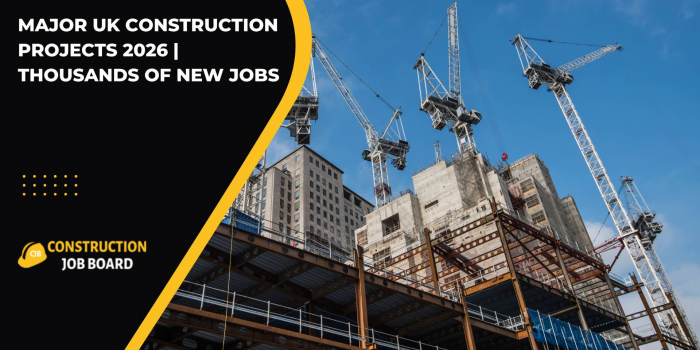How to Build a Winning Construction CV with Examples | Top UK Construction Jobs
09/09/2025

How to Build a Winning Construction CV (with Examples)
The UK construction industry is thriving in 2025 and there are opportunities across many specialist and managerial positions, whether you are applying for Quantity Surveyor jobs, Construction Manager jobs, or practical Skilled Trades and Labour roles, a great CV showcasing your relevant experience, qualifications and skills is the way to obtain interviews for jobs and to stand out from the crowd.
This guide will provide you with examples, across different roles, of how to produce a winning construction CV using industry-recognized tips that recruiters value.
Why it’s important to have a strong Construction CV
Construction recruiters and hiring managers will receive hundreds of applications against each vacancy. A CV that clearly identifies your technical skills, project experience, and achievements puts you ahead of the competition, whether you are applying for Civil Engineer jobs, Site Manager jobs or Project Manager jobs.
Your CV should not just outline a set of duties but demonstrate the measurable outcomes achieved as a result of your responsibilities e.g. cost savings, improved safety or successful project completions.
Essential Components to include in your Construction CV
Always place your name, phone number, professional email, and LinkedIn profile at the very top. Make sure your CV is clearly formatted, using consistent fonts, bullet points, and spacing. A clean, well-structured layout makes it easier for recruiters to quickly scan and shortlist your application.
- Professional Overview
This is your personal elevator pitch. For example:
“Chartered Building Surveyor with 8+ years experience across residential and commercial projects; specialising in cost-effective property management and structural evaluations.”
- Key Skills
You will want to tailor this section for whichever job type you are applying for:
for Estimator jobs: cost forecasting, tendering, and contract negotiations
for Design Manager jobs: CAD software, BIM systems, and design from concept through to delivery
for Foreman roles: supervising a group of people, health and safety regulations, and productivity monitoring, and reporting
Soft Skills
In addition to technical expertise, construction recruiters value leadership, communication, problem-solving, and teamwork. Mentioning these can set you apart, especially for management-level roles.
- Career History
Here, you will want to detail a few of either the projects you have been on or results achieved. Employers will really want to see action-based results. For example:
“Management of £5 million infrastructure project while Contracts Manager; delivered on time and under budget; managed to achieve 12% savings on contract cost by negotiating directly with suppliers as a result of identified cost reductions.”
Achievements / Key Projects
Highlighting 3–5 of your biggest achievements or key projects helps your CV stand out. For example:
“Reduced project delivery time by 15% through improved resource allocation.”
“Oversaw the completion of a £10m commercial project with zero safety incidents.”
- Education & Certifications
Please detail your credentials. This should, obviously, include your RICS, or CIOB, or ICE, or NEBOSH, etc, depending on your role.
Professional Affiliations
Memberships in professional bodies such as RICS, CIOB, ICE, or Chartered Institute of Building Services Engineers (CIBSE) add credibility and show commitment to industry standards.
CV Examples by Job Role
Quantity Surveyor jobs: You will want to demonstrate cost planning, tendering, and financial management.
Construction Manager jobs: You will want to demonstrate the leadership of a project, maintaining the safety standards, and coordinating multiple teams.
Contracts Manager jobs: You will want to demonstrate contract administration, managing key suppliers, and resolving disputes or conflicts.
Estimator jobs: You will want to demonstrate that you created accurate bids, reduced costs, and won competitive tenders.
Architect jobs: You will want to demonstrate design innovation, compliance with the building regulations, and delivery of sustainable practices.
Building Surveyor jobs: You will want to demonstrate inspection of the property, planning maintenance, and assessing value-for-money assessments.
Site Manager jobs: You will want to demonstrate day-to-day operations on the site, supervising workforce, and health and safety duties.
Project Manager jobs: You will want to demonstrate delivering a project from full lifecycle, managing a budget, and communicating with stakeholders.
Design Manager jobs: You will want to demonstrate design reviews, coordination of planning, and use of modern tools in design management.
Civil Engineer jobs: You will want to demonstrate structural analysis, infrastructure design, and compliance standards.
Foreman jobs: You will want to demonstrate leading a skilled trades workforce, increasing efficiencies, and adhering to deadlines.
Skilled trades and labour roles: You will want to describe practical skills, safety training, and trade specific certifications.
Tips for Making Your Construction CV Stand Out
Use action words; e.g. - ‘delivered,’ ‘managed,’ ‘implemented.’
Quantify your achievements; e.g. - ‘delivered material cost reductions of 10%.’
Tailor your CV to each job description, using the same keywords the employer used.
Keep it to 2 pages; this is a sweet spot for most construction roles.
Include certifications, CITB, CSCS cards, RICS membership, or apprenticeships where relevant.
Optimize for Applicant Tracking Systems (ATS)
Most recruiters use ATS software to filter CVs. Use industry-specific keywords from the job description (e.g., “AutoCAD,” “NEC Contracts,” “risk assessments”) so your CV passes automated screening and reaches hiring managers.
Keep it to 2 pages; this is a sweet spot for most construction roles.
Include certifications, CITB, CSCS cards, RICS membership, or apprenticeships where relevant.
Portfolio / Work Samples
For roles such as architects, design managers, or civil engineers, attaching a portfolio link (e.g., to a PDF or online site) showcasing drawings, models, or project case studies can give you a competitive edge.
FAQs: Crafting an Effective Construction CV
- What CV format works best for a construction CV?
Whatever format you use, a reverse-chronological format works best beginning with your most recent role. This is particularly useful as
project managers and many site managers start as assistants or graduated into these roles over time.
- Should I include project specifics on my CV?
Definitely. For a role such as a quantity surveyor, civil engineer or on-site manager, project specifics link demonstrated outcomes to competence and technical ability.
- How long should my construction CV be?
Whilst the norm is 2 pages, senior professionals applying for construction manager roles or contracts manager roles can add a third page if needed.
- What keywords should I use when marking up a construction CV?
Documents that directly relate to their professional role such as estimator roles, architect, skilled trades and labour roles etc. as that is often how recruiters search your CV in a CV database.
- Should I include qualifications on my construction CV?
Yes, definitely. Recognition like RICS, CIOB, NEBOSH is important as well as CSCS cards as they relate to obtaining work in Building Surveyor jobs and Foreman jobs

































































































































